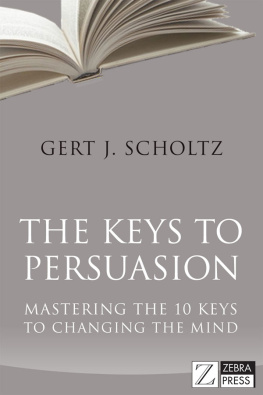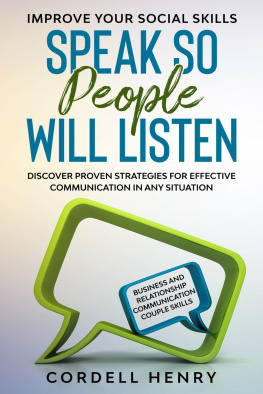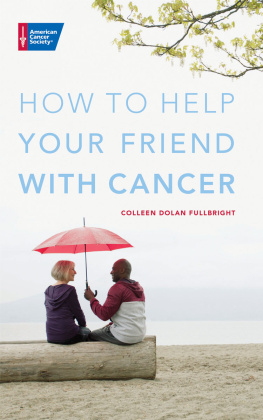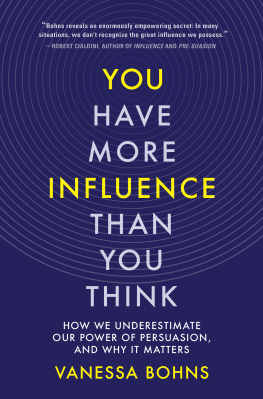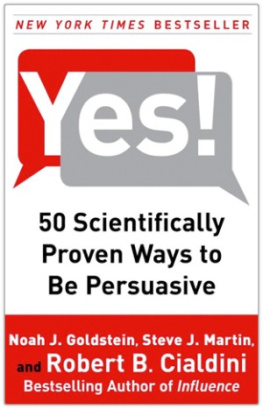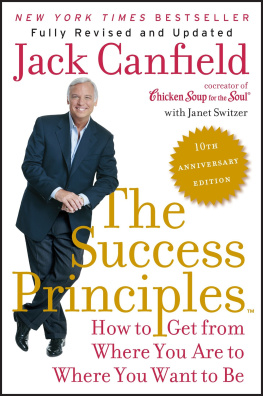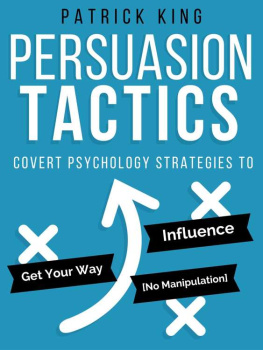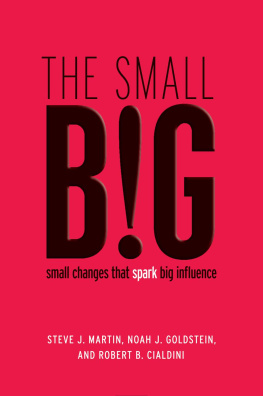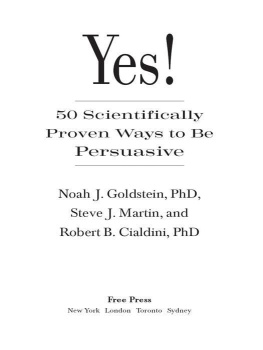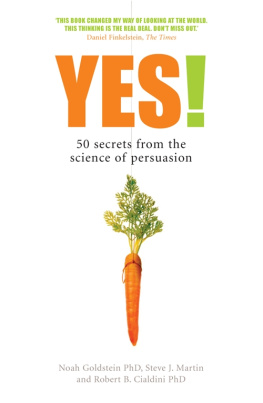
Steve Martin, Noah Goldstein and Robert B. Cialdini are renowned practitioners of the science of persuasion. Together, they are the authors of the Royal Society Prize-listed international bestseller Yes! and The small BIG.
By the same authors:
Yes! 60 Secrets from the Science of Persuasion
The Small Big: Small Changes that Spark Big Influence

First published in Great Britain in 2018 by
Profile Books Ltd
3 Holford Yard
Bevin Way
London WC1X 9HD
www.profilebooks.com
Copyright Noah J. Goldstein, Steve J. Martin,
Robert B. Cialdini 2018
The moral right of the authors has been asserted.
All rights reserved. Without limiting the rights under copyright reserved above, no part of this publication may be reproduced, stored or introduced into a retrieval system, or transmitted, in any form or by any means (electronic, mechanical, photocopying, recording or otherwise), without the prior written permission of both the copyright owner and the publisher of this book.
All reasonable efforts have been made to obtain copyright permissions where required. Any omissions and errors of attribution are unintentional and will, if notified in writing to the publisher, be corrected in future printings.
A CIP catalogue record for this book is available from the British Library.
eISBN 978 1 78283 451 9
CONTENTS

PREFACE

According to John Lennon, the moment when he began to fall in love with Yoko Ono occurred at an installation of her work at the Indica Art Gallery, London, in November 1966. Among the exhibits on display, one in particular stood out. In order to view it, gallery visitors were required to climb a dimly lit, shaky ladder. Once at the top they were instructed to peer through a spyglass at a small area of the ceiling, where a single word was displayed in barely perceptible letters.
The word was small and simple yet it struck Lennon with so much force that he began to fall emotionally for the woman who arranged for him to see it. For him, the words healing power resonated, particularly in the context of a dangerous, unstable world.
The word was not love, as most people think. Instead it was a word that both leads to and flows from love, and arguably is much more obtainable within the wider array of social interactions that we all encounter.
The word was Yes.
We can all recognise the enormous impact that Yes can bring. Yes allows relationships to blossom. It provides encouragement to learn and explore. It can mean a green light for our projects, and opportunities confirmed. Yes gives us permission. And it fulfils the most basic of human motivations our need to connect with others.
But were all just as familiar with the frustration of hearing No. Just because the word Yes is a simple one, we shouldnt be fooled into believing that we can easily secure it from others. At least not without knowing about certain aspects of the persuasion process.
The Little Book of Yes contains twenty-one short chapters each will require only five or ten minutes of your time to read outlining a series of effective persuasion strategies. Each strategy has been proven to increase the chances that someone will agree and say Yes to your request. That someone could be a colleague, a partner, a manager, a friend, even a stranger. The lessons from this book can be used to tackle a variety of everyday persuasion challenges that you might face. From repairing a soured relationship to asking for a higher fee or pay rise. From persuading someone on Twitter to see your point of view to requesting help from a neighbour or family member. From convincing a dithering friend to take action to building your social network.
Persuasion isnt magic. While some people might appear to have been born with a natural ability to influence others, that doesnt mean that the rest of us should resign ourselves to never getting our ideas or requests accepted. For decades, persuasion researchers have been studying the principles and strategies that have been shown to be universally effective at influencing others. As world-renowned persuasion scientists ourselves, we will only present ideas and principles that have been scientifically proven to increase the chances that you will be persuasive. We will talk about a variety of principles in this book, and show how to use them in effective and ethical ways. In one chapter (boost your confidence and change the way others see you. Whether you decide to dip in and out of the book or read it cover to cover we are confident that you will learn lots of things that can result in your hearing the word Yes a little more often in your personal and professional life.
One word of caution. Getting a Yes once doesnt necessarily mean that you will hear it again from the same person in the future. Anyone left feeling like they have been tricked, coerced or manipulated into Yes is likely to respond with its exact opposite in any subsequent interactions. So to accomplish the goal of repeated persuasive success, it is necessary to employ these insights and techniques in responsible ways. Knowing how to get to Yes is a powerful tool and this book is just the start.
We wont claim that Lennons famous song All You Need Is Love should really have been called All You Need Is Yes! But we will say that if you understand and employ this books insights in thoughtful and responsible ways, you will start to hear the word Yes a lot more. In your professional life, and in your personal life too.
GIVING

Giving to others is the first step to getting what you want
Research has long demonstrated the value of a generous spirit. After providing gifts, favours, information and help to others, we typically become more liked, feel more appreciated and, according to evolutionary research, can even experience improved physical health and feelings of well-being.
The act of giving is central to the human condition and has a particular relevance when it comes to the act of persuasion for a simple reason. Those who have received help and assistance are, by and large, more inclined to help in return if that giver ever needs assistance in the future. It is a concept that flows from the norm of reciprocity: the social rule that demonstrates the willingness of people to give back to others the form of behaviour they have first received themselves.
All human societies instil this powerful social rule in their members from an early age. Your parents will almost certainly have taught you to treat others as you would like to be treated yourself. Your grandparents would undoubtedly have instructed your parents in the same way. They will have done so for a simple yet profound reason. The rule of reciprocity typically confers greater advantage to all concerned by encouraging the exchange of resources. What results is greater cooperation, increased efficiencies, and mutually beneficial and longer-lasting relationships.
Next page


